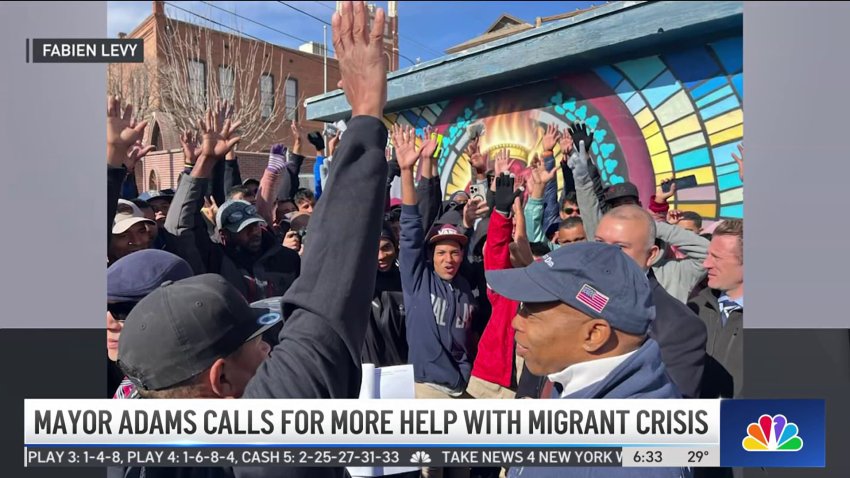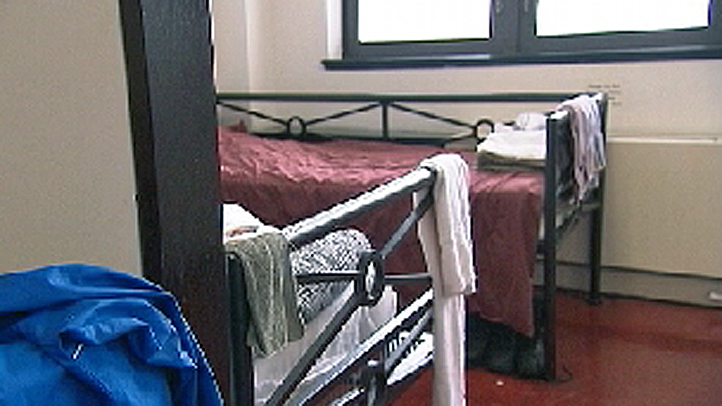New allegations claim New York City is violating the right to shelter, specifically for women entering its homeless system. News 4’s Melissa Russo reports.
There are new allegations that New York City is violating the right to shelter for women entering its homeless system, as some say poor conditions, long delays and accommodations for migrants are causing them to choose the streets instead.
Kathia Wiscovitch, a victim of domestic violence, says applying for a NYC shelter bed this week was so chaotic and scary — she walked out and moved into a rental car.
“I hit rock bottom and there's no assistance for people like me,” she told the NBC New York I-Team.
Watch NBC 4 free wherever you are
Wiscovitch said she was in disbelief over her situation, spending long nights in a parked car — a painful choice, especially after being forced to leave her Brooklyn home last weekend.
Get Tri-state area news delivered to your inbox with NBC New York's News Headlines newsletter.
“I'm in a domestic violence situation. I feel so hopeless,” she said. “Hopeless, like I didn't know which direction to go.”
Wiscovitch has two jobs, a college degree and a promising professional dancing career. She also has an order of protection against her abuser, and a city caseworker assigned to help her.
Text messages viewed by the I-Team show that caseworker with the City's Family Justice Center mistakenly sent Wiscovitch to a shelter on Williams Avenue in Brooklyn in search of a bed.
But even though the sign on the door still reads “Help Women's Center,” Wiscovitch learned it's not a women's shelter anymore — because the city recently repurposed it to house migrant men, now flooding into city shelters by the thousands.
A spokeswoman for the Family Justice Center did not respond to a request for comment about the mistake.

After informing her caseworker that Williams Avenue was not an option for her, Wiscovitch moved on, heading to the only remaining women’s intake center in the city: Franklin Avenue in the Bronx.
“It’s inhumane,” Wiscovitch said, adding that she waited there for about 12 hours, until she could not bear any more.
“There was people in hospital gowns. There was other people drunk, they kept hitting me. There's people with mental illnesses,” she described. “So if you get up and someone sits, that's it, you can't fight. You don't have a bed so everyone is fighting over the chairs.”
After hearing from others that the wait can take as long as 24 hours or even days, she says she gave up at 2 a.m. and headed for a rental car, stressed out and needing to sleep because she had work the next morning.
“I literally cried in my car and then…I fell asleep,” she said.

As heartbreaking as Wiscovitch’s story is, the I-Team learned after interviewing her that she’s not alone.
"We’ve heard of women who have been waiting days in order to get access to a regular bed, some have stayed overnight on chairs,” said Tim Campbell, the director of programs at the Coalition for the Homeless. “These are violations of the right to shelter. When somebody comes into the shelter system they deserve a bed that night and they should get a bed that night and that is the legal requirement. That is not happening at Franklin.”
The Coalition for the Homeless and the Legal Aid Society told the I-Team they've been warning the city for two weeks about increasing concerns from their clients.
“They were waiting in an area that smelled of urine,” said Campbell. “Women have been going to stay in the streets, and we’re deeply concerned about people not getting beds that they deserve. These violations are as serious as they can get in terms of the right to shelter.”
The Legal Aid Society suggests the city's repurposing of its Brooklyn women's intake office into a migrant shelter has put stress on the women's system, which now has just one intake center.
“It appears the Franklin intake site is not sufficiently staffed to handle the increased volume,” said Legal Aid Staff Attorney Josh Goldfein.
The City’s Department of Social Services did not offer direct answers to the I-Team's questions about whether converting that women's intake office into a migrant shelter contributed to delays.
In fact, in response to a series of specific questions, DSS did not acknowledge nor admit to any delays in providing shelter beds to women — saying in a statement that "any reports of challenges or issues are taken seriously, investigated and addressed."
But the Coalition for the Homeless, which has power to monitor shelter conditions under longstanding court orders, says they have been flagging the Adams administration about what they called "disturbing" violations at Franklin Intake Center since January 9. After receiving no response, Campbell says they arranged to visit the Franklin Shelter on Tuesday and their visit confirmed what their clients were telling them.
In an email Thursday to DSS obtained Friday by the I-Team, the Coalition said their clients had been unable to access beds on at least six separate occasions — with some instances involving approximately 30 women.
The subject of the email was "Serious Failures at Franklin" and asked the city to share its "plans for immediately addressing the unacceptable situation at Franklin, which is endangering the health and wellbeing of our clients."
Despite those prior flags from the Coalition for the Homeless, DSS spokesman Nicholas Jacobelli told the I-Team on Friday he was unaware of any delays and would check again.
DSS said in a statement that "there are adequate vacancies within the single adult women shelter system" and that Franklin staff "work diligently to meet the needs of all clients."
It's unclear how long Kathia would have had to wait for a bed had she not decided to leave the city's intake office.
But she said through tears that she still feels "stuck in the system and it's very overwhelming." Wiscovitch is hoping to find a bed in a private domestic violence shelter.
The city, which has had to open more than 70 emergency shelters to house migrants since summer of 2022, insists that there are beds available for women in its system.



